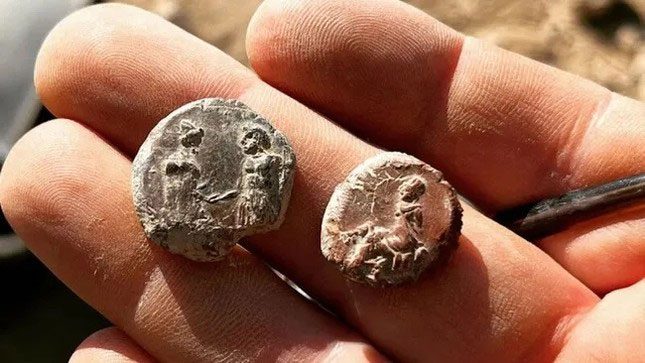Archaeologists in Turkey have unearthed over 2,000 clay seals that ancient officials used to seal government documents.
The researchers discovered this collection of seals during excavations at Doliche, an ancient Roman city located near Gaziantep in southern Turkey.

Two of the many clay seals found at Doliche in Turkey. (Photo: Forschungsstelle)
The clay seals range in size from 5 to 20 mm and were used to seal documents made of papyrus and parchment, a material made from sheep or goat skin. Each seal features engravings of different deities or religious symbols.
Michael Blömer, a professor of archaeology at the University of Münster in Germany, stated: “Seals are small clay tags that were wrapped around strings to secure legal documents and correspondence. The seal was then pressed into clay to seal the documents. These seals showcase a variety of images, including depictions of gods and goddesses, some of which feature portraits, while others have inscriptions.”
Doliche: The Sacred Site of the Sky and Thunder God
According to Anatolian Archaeology, at one time, Doliche was an important religious center and the sacred site of the Roman god Jupiter Dolichenus, the god of sky and thunder.
The newly discovered artifacts were found within the ruins of the old city storage building, which was in use from the mid-2nd century to the mid-3rd century AD.
However, all that remains of the building are some limestone walls. Archaeologists in the area told Anatolian Archaeology that the documents themselves were destroyed in a major fire, possibly in 253 AD, when Persian king Šāpūr I devastated many cities in the Roman province of Syria.
This is not the first time Professor Blömer and his team have been impressed by Doliche. In previous excavations, they uncovered about 4,000 similar seals at the site.


















































